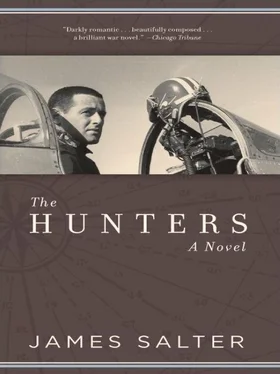“She can’t go to her home,” Mary said, “because he’s an American.”
“Is that bad?” Cleve asked.
“Japanese boys won’t have her now.”
It seemed very quiet in the bar.
“How about you, Mary?” DeLeo asked.
“Yes?”
“Don’t you have a boyfriend?”
She surrendered a shy smile but did not answer.
“Well, do you?”
“Yes.”
“Where is he?”
“Not here.”
“Not in Tokyo?”
“He isn’t here.”
“I understand that all right. Where is he, though?”
She seemed embarrassed. She walked the length of the bar to place another record on the machine.
“He’s not here yet,” she said.
“Not yet?”
“No. Same as brue bud.”
“What?”
“Brue bud.”
“What did she say, Cleve?”
“I didn’t understand it, either. The what, Mary?”
“The brue bud. Of happiness,” she added.
“Oh, the bluebird,” DeLeo said.
“Yes,” she smiled. “To come here some day.”
“I guess so.”
Cleve went to bed feeling very tired. He could hear the chirping of insects outside, and the continuous, high call of crickets. He lay quietly, looking into the darkness with unblinking eyes. He was thinking of the girl who would not be a maid and the other who waited for her American lover. He envied them. He would have liked to enter their fairy tale with them, their opera; for it seemed somehow that, despite the sadness, when the curtain fell they would find the youth in them to laugh and go elsewhere. But he had stepped into an arena. He had joined a dark, ultimate battle, as all the while the current of days bore him slowly down.
The morning was blue with a warm wind blowing. They ate a late breakfast, and when Cleve took out his wallet afterward, he came upon something he had almost forgotten, a note of introduction to a Mr. Miyata whose brother had been a friend of Cleve’s father in Washington, before the war. Cleve smoothed the folded piece of paper. He had been given it in the States, in the event he had the occasion to be in Tokyo. He looked at the address again and tried to imagine where it might be. Through the city on a fine day to see something of its lesser parts, he considered that for a while. In the afternoon, not knowing what to expect, he went to call.
Miyata was an artist, known to a degree as a leader of the young antitraditionalists. The studio where he lived and worked was in an outlying section. Cleve’s driver had trouble finding it. The address was straightforward; but in the provincial suburbs, even the police could not direct them to it. Finally, a grocer in the neighborhood was able to point out the right street. It was narrow and climbed a steep hill. They labored up it, pausing to search for house numbers. At last they stopped before the right one. There, set back at the end of a concrete path and in the midst of untended lawn, stood a small, weathered house. As he crossed the patio on which a trio of glass doors opened, Cleve caught a glimpse of someone standing inside. He knocked at the door. It was opened after a pause. Cleve introduced himself and presented the note. The man he assumed was Miyata read it quickly, breathed an audible assent, smiled, looked up, and offered his hand, apparently pleased to receive the visitor. He confirmed the relationship so readily this way that Cleve had an uneasy feeling he had never really heard of anyone named Connell.
“Come in, sir,” Miyata said.
He was a gray-haired man in his late forties. He seemed much younger. Small, but firm-skinned and muscular, everything about him implied great energy.
Cleve was invited to remove his shoes in a narrow, sunken entrance just inside the door and follow into the house. The exterior had been deceiving. They came into a large, well-lit room that seemed to be more than the house could have contained. In one corner were piles of books. Everywhere else were canvases. They were stacked against the walls. They hung side by side, higher up. Cleve stood in the center of the room and stared. The work of years was here in a style muted but commanding. He had never seen anything like them. The colors were dominated by blue and gray with Oriental mood and pose. Many were nudes, some life size. The eye slid from their frankness, but still they were so religious, with such patient, calm devotion, that Cleve felt himself held undisturbedly before them.
There was a couch, a few chairs, and a coffee table. Everything else was working materials. Curled tubes of paint littered the floor like lead grubs. It was a spring afternoon. They drank lemon soda and talked. As they did, Cleve felt he had somehow entered a level of the city that he had not imagined existed.
Miyata was fluent and intelligent. Nothing was beyond his curiosity. He seemed to be above the confusion of life, as if he had been commissioned to spend his own in undisturbed judgment of the world about him, protected always by a mandate from the gods. They spoke briefly of Korea and then of the past war with the United States. Miyata had been in Japan for its entire duration and must have been deeply affected, but when he talked about it, it was without bitterness. Wars were not of his doing. He considered them almost poetically, as if they were seasons, the cruel winters of man, even though almost all of the work he had done in the 1930s and early 1940s had been lost when his house was burned in the great incendiary raid of 1944. He described the night vividly, the endless hours, the bombers thundering low over the storms of fire.
“All of your work?” Cleve said. “It must have been like being killed yourself.”
Miyata smiled.
“One would think so,” he replied, “and I, myself, did at first, but no, it was not. It was finally like being born again, I decided. I started life for a second time.”
They talked of Japan, of France where he had lived and studied for six years, of Tahiti, and the former Japanese-mandated islands in the Pacific. His opinions and observations were all somehow fresh. They seemed not to be preconceived, but as if he were bringing them forth for the first time. They talked about the movies. Miyata was very interested in them. He knew and had seen all the great ones, American, French, Russian, Italian—anything that had played in Japan.
“It must be the most difficult of the arts,” he said, “combining all the others; and for it to be perfect, every part of it must be.”
They wandered over to the part of the room where the books were strewn. There were Japanese movie magazines and five or six bound annuals, along with definitive volumes on films and their history. They leafed through these, sometimes pausing to discuss specific pictures they had both seen. Cleve found it strange. It was an unexpected interest for a man like Miyata to have. It was all hard to believe. Somehow, idly he had made his way here, to this small house above the city, far from any of the world he knew. It was a strange reality in which he was not sure of anything, only the pleasure of a few uncommon hours. He stared out the broad windows. They had talked for a long time.
In the late afternoon he heard someone at the entrance, setting shoes down in the well there. He glanced over his shoulder. It was a girl. When she saw that there was a visitor, she turned not to enter the room, but Miyata called her in. She came forward a few steps. As he saw her clearly for the first time, Cleve felt the moment would be one of the few remaining to the end.
“This is my daughter, Eiko.”
“How do you do,” Cleve said, hearing his own voice isolated and distinct. It sounded absurd.
She dropped her gaze.
“How do you do, sir,” she said. It was polite and disinterested.
Her hair was perfectly black and as fine as a young child’s. She was nineteen. She stood in the splendor of that, calm and confident beyond words. She was on the walls of the studio, too, he was certain. It was an effort not to look and see her in the paintings.
Читать дальше












